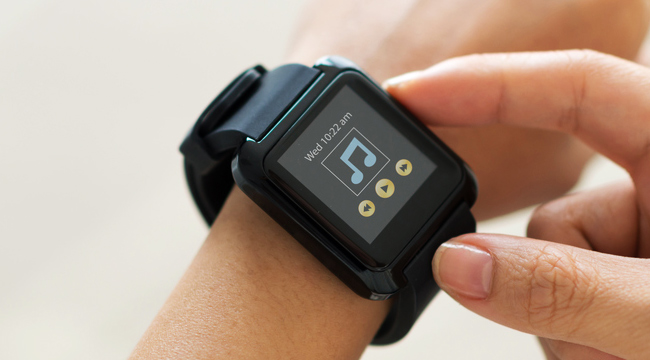
Now that the world over has officially ushered in 2018, it’s time to make your bold new resolutions for the year ahead. New body! New attitude! New you! Knowing, of course, that they’re all sure to come undone by the end of January.
We humans have been prone to breaking resolutions for as long as we’ve been making them, but the new era of tech is helping us in the Sisyphean quest to actually do what we say. For those who fully intend to take on the New Year with a renewed approach to health, technology is on your side. Or, more accurately, on your wrist.
As we continue forward in an era where technology is poised to become the medicine of the future, here’s a look at how your smartwatch can help you keep those resolutions well into the new year and beyond.
Getting In Shape

Becoming more active is one of the most popular New Year’s resolutions every year, and while it can be a challenge to stay up to task, step trackers (or pedometers, if you want to get technical) are one of the easiest ways to do so. Having been around in some form since the 15th century, the first modern-day version mass-marketed in 1985, based on the idea that 10,000 steps was the number to hit each day for optimal health. Now, peds are found on virtually every piece of wearable tech — from the most basic Fitbit to the latest generation of smartwatch. The best part is they work automatically, so as long as you’re wearing the device, it will keep track of your movement.
When you start seeing the number of steps you take each day (or lack thereof) the smartwatch pedometer seems to have an innate ability to get you moving. Whereas I used to assume my two daily walks around the neighborhood with my dogs was enough, seeing that it only added up to about 7,000 steps made me realize I simply wasn’t moving as much as I wanted. By setting a daily step goal, your smartwatch will gently nudge you to get up and walk via occasional push alerts. It’s so gently persistent that it can even prompt you out into adverse weather to make sure that your daily goal is met.
Granted, getting (and staying) active shouldn’t be limited to keeping track of your daily steps. For those wanting to expand their fitness routine, the two main options are Google Fit and Apple Health — for the Android and iOS platforms, respectively. They both work in conjunction with multiple fitness apps to track your exercise duration, the calories you burned, and your average heart rate. They can even access your medical records remotely to help paint a broader picture of your health, which can also do wonders for your motivation.
Be Less Stressed Out

This seems like a multi-faceted problem that a little piece of tech on your wrist can’t help. And to a certain extent, that’s true. But there are some ways that you can use a smartwatch to help reduce the amount of stress you feel on a daily basis. Several smartwatches have apps that will occasionally remind you to step back from what you’re doing and take a few deep breaths to help calm yourself. It’s a simple exercise that can go a long way in reducing stress and help you to take a more relaxed outlook on the neverending to-do list that makes up your life.
Some apps, including Android’s BreatheWell and the native function on the Apple Watch, will guide you through slower, deeper breaths with animation you can sync with. They can even end your 60-second breathing session will a readout of your blood pressure, giving you some hard numbers about your health while you take the time to clear your head.
Develop Better Sleeping Habits

One of the biggest things we tend to shortchange ourselves with — health wise — is a getting the requisite amount of sleep each night. Like smartphones, most wearable tech can be set with an alarm signaling when it’s time to start packing it in for the day. Of course, this can be easily ignored in favor of watching one more episode of Black Mirror during your Netflix binge-a-thon. Or worse, when you drag your phone into bed with you and spend the next hour or so scrolling through social media before actually sleeping.
Granted, there’s no dedicated app for leaving your phone in the other room before bedtime (though it is a good habit to get into), apps like Android’s Sleep will monitor when you go to sleep and sound an alarm at the optimal time for minimal morning grogginess. By monitoring your slumber, it can help diagnose any sleep-related illnesses you might be suffering from. Knowing this info can help you get the best possible night’s sleep, making you more rested and better prepared to handle the day in front of you.
Eat Better

While all the added exercise will do wonders for healthier living, it’s imperative that you balance it out with better eating habits. After all, no matter how much you exercise, you can’t outrun a bad diet — even if you walked to Burger King to devour an order of Flaming Hot Mac N Cheetos.
Right now, the best option out there is MyFitnessPal, which is available on all smartwatch platforms. Though it’s still up to you to log each individual meal, it has an easy-to-use interface and more than five million foods in its database. Even better, it can automatically sync up with other fitness apps, giving you the most comprehensive approach to a healthier lifestyle.
Listen To More Music

Okay, so this isn’t necessarily a health-related resolution, but the New Year is as good a time as any to broaden your musical horizons. Not only that, but as wearable tech continues to improve by leaps and bounds, the ability to listen to music on the go without lugging your phone with you is easily one of the best perks offered. With apps like Spotify and Apple Music, you can keep custom-made playlists with you, whether you’re running a marathon or taking a jog around the block. Or if you’re feeling particularly adventurous, you can fire up Pandora or Spotify’s discover function to find new music while you’re out on the move — curating the perfect soundtrack while working toward keeping a healthier lifestyle overall.
